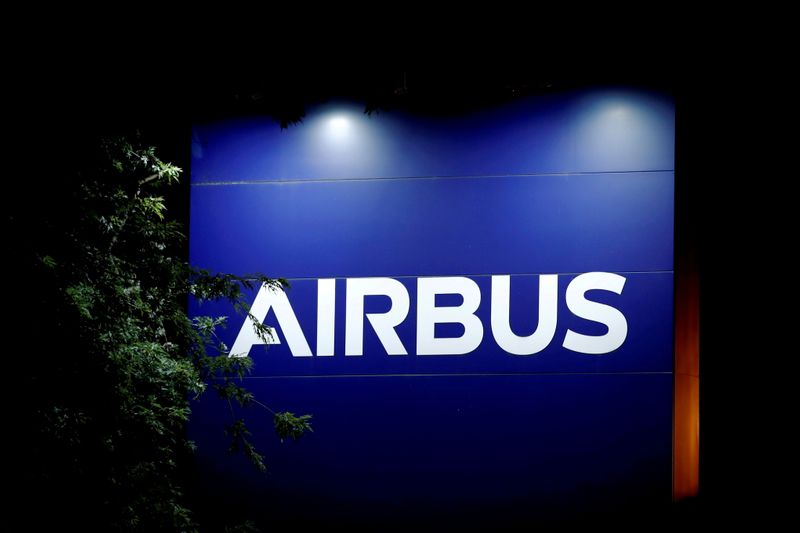By Tim Hepher
PARIS (Reuters) -Airbus overcame new snags in its global supply chain to maintain a widely watched forecast for 600 jet deliveries this year, pushing its shares higher despite signs of labour shortages as the economy exits COVID-19 "hibernation".
The world's largest planemaker lifted full-year profit and cash targets after profits held up better than expected in the third quarter, and refused to bow to industry critics who have questioned its bullish forecasts for jet production.
Airbus shares opened up around 3%, ignoring a retreat in global stocks after a series of supply chain warnings, before easing back to stand 1% higher.
Chief Executive Guillaume Faury said the recovery towards pre-crisis output levels was under way after 15 months in which the European group kept its foot on the brake to avoid adding to a glut of aircraft during the airline industry's worst crisis.
"We observe labour shortages around the world impacting all sectors," Faury told reporters.
"We are now in the ramp-up and we see all the difficulties of going from a sort of hibernation, and back to business in a world where many commodities and sectors are ramping up again."
Airbus said it was facing some problems in receiving parts on time, leading to rework on jets and contributing to a recent flattening of deliveries, but said none appeared systemic.
"We think these can be managed in the last months of the year," Faury said.
Analysts said that after years of turmoil in aerospace, with Boeing (NYSE:BA) in particular still facing industrial problems, the decision to maintain deliveries provided a boost.
"It's essentially back to 'deliver, make profit, repeat,' said Agency Partners analyst Sash Tusa.
Airbus reported a 19% drop in third-quarter operating profit to 666 million euros ($772.7 million) as revenues slipped 6% to 10.518 billion. It said it was looking for full-year operating profit of 4.5 billion euros and free cashflow of 2.5 billion, up from previous targets of 4 billion and 2 billion respectively.
Analysts were on average expecting operating profit of 623 million euros, based on a company-compiled consensus.
STICKING TO OUTPUT VIEWS
Airbus rounded up its main A320-family production target to 65 a month by summer 2023, carving out some room for slippage in the timetable. In May, it had said it was planning a firm rate of 64 a month by second-quarter 2023.
Airbus insisted it remained on the same overall trajectory. It sees a rebound in air travel demand, especially in the busy A320 category where Boeing's 737 competes.
But it remains locked in a dispute with suppliers and leasing companies over its ambitions to raise rates as high as 75 a month by 2025.
Engine makers and lessors have protested, saying the proposal risks overheating the market and damaging their own businesses, which depend heavily on the life of older planes.
Some in the industry privately accuse Airbus of dumping jets to snatch market share from troubled Boeing - something Airbus denies, saying its output decisions are fully underpinned by demand.
Boeing, whose rates are capped at lower levels as it also recovers from an overlapping safety crisis, implicitly weighed in on Wednesday when Chief Executive Dave Calhoun warned of a "supply-constrained world" from second-half 2022 through 2023.
"We know that there are a lot of views on this but we have our own views, and our own view is that the demand supports rate 75, but we need to look at the supply chain situation," Airbus' Faury said.
He did not say whether Airbus still aimed to reach that level by 2025, but later told analysts: "We are considering 70, 75 moving forward because we see the very strong demand for the 320 moving far away in the second half of the decade".
Sources say the clash between leasing companies or suppliers and Airbus reflects contrasting interests, pushed to boiling point by the crisis. Planemakers make money on new sales rather than relying on older jets to generate repairs and rent.

Lessors step in when times are hard and they fear jets being devalued by overproduction. Some critics accuse them of hoarding future production slots, even when they say there is no demand.
In large-jet programmes, Airbus said it would lift depressed A330 output from two a month to almost three at end-2022. It reiterated it would raise flagship A350 output from five to six a month but delayed this to early 2023 from autumn 2022.